
In Syria, 33 Turkish soldiers were killed in an airstrike by Russia-backed Syrian forces in rebel-held Idlib in a major escalation on Thursday. Turkey has vowed to respond in kind, as U.N. Secretary-General António Guterres calls for an immediate ceasefire, saying “the risk of even greater escalation grows by the hour.” Russian President Vladimir Putin and Turkish President Recep Tayyip Erdogan reportedly spoke by phone on Friday to discuss the crisis, as NATO urged rapid deescalation. The all-out offensive by the Syrian government is the single largest displacement in a nine-year war that has forced 13 million to flee and left hundreds of thousands dead. Since December alone, some 900,000 people, at least half of them children, have been displaced from northwestern Syria. As the humanitarian catastrophe deepens, aid workers are describing scenes of chaos and devastation on the ground, with families scrambling for shelter as temperatures fall below freezing. We speak with Avril Benoît, the executive director of MSF USA, or Doctors Without Borders USA.
More from this Interview
- Part 1: Catastrophic Humanitarian Crisis in Idlib as Syrian Troops Advance & Children Freeze to Death
- Part 2: Doctors Without Borders: Cheap Coronavirus Diagnostic Kits Needed in War-Torn Areas & Refugee Camps
- Part 3: No Way Out: Report Finds Central American Asylum Seekers Trapped in Mexico in Dangerous Conditions
Transcript
JUAN GONZÁLEZ: We begin today in Syria, where 33 Turkish soldiers stationed in the rebel-held Idlib province were killed in an airstrike by Russian-backed Syrian forces on Thursday. It’s a major escalation in the all-out offensive by Bashar al-Assad’s regime and its Russian allies, that has displaced some 900,000 people from northwestern Syria since December. Turkey, which has long backed rebel forces in Syria, has vowed to respond in kind, as U.N. Secretary-General António Guterres calls for an immediate ceasefire, saying, quote, “the risk of even greater escalation grows by the hour.” Russian President Vladimir Putin and Turkish President Recep Tayyip Erdogan reportedly spoke by phone on Friday to discuss the crisis as NATO urged rapid deescalation. This comes as Turkey has temporarily opened its border for fleeing Syrian refugees to cross through the country to Europe.
AMY GOODMAN: Of the nearly 1 million people displaced from Syria since December alone, at least half of them are children. It’s the single largest displacement in the nine-year war that’s forced 13 million to flee, left hundreds of thousands dead. As the humanitarian catastrophe deepens, aid workers are describing scenes of chaos and devastation on the ground, with hundreds of thousands of families scrambling for shelter as temperatures fall below freezing. Children have frozen to death in the dire conditions. All the while, bombs continue to fall. On Tuesday, the Syrian regime bombed eight school facilities, killing 21 people, according to aid workers. This is UNICEF’s Executive Director Henrietta Fore.
HENRIETTA FORE: Tens of thousands are now living in makeshift tents, in public buildings, in open air, huddled under trees, exposed to rain and snow in sub-zero cold of the harsh Syrian winter. The recent strikes on these makeshift camps in Idlib — and on the children and teachers horrifically killed just two days ago as 10 schools were attacked — are both reprehensible and morally repugnant. Also these acts clearly demonstrate the terrifying daily conditions of those living through this nightmare. And we’ve heard and read reports of children freezing to death. When wood runs out, families burn whatever they can find — plastic bags, garbage, discarded furniture — just to provide a flicker of heat against the cold or a simple fire to cook whatever food they can find.
In these informal settlements, children and women are at particular risk of violence and exploitation. Makeshift toilets offer no safety or privacy. Land mines and improvised explosive devices dot the landscape. Every step people take is a risk. In the northwest, 280,000 children have had their education cruelly snatched away. An estimated 180 schools are out of operation, destroyed, damaged or being used for shelters — another blow to children’s hopes and futures. Access to healthcare is almost nonexistent or financially out of reach. Hospitals continue to be targeted. Seventy-two have suspended services because of the fighting.
AMY GOODMAN: That’s UNICEF’s Executive Director Henrietta Fore addressing the U.N. Security Council yesterday.
Well, for more, we’re joined here in New York by our guest Avril Benoît. She’s executive director of Médecins Sans Frontières USA. That’s MSF, or Doctors Without Borders USA.
Welcome to Democracy Now! Talk about the crisis in Syria. Nine hundred thousand people. Talk about the scope of this.
AVRIL BENOÎT: The scope is unprecedented, certainly for Idlib. That whole area was considered a kind of safe zone. People who had been relocated because of the retaking of territory and different movements of people, many of them had ended up in this Idlib area. So, it was, yes, controlled by opposition armed groups.
We were trying to support hospitals there. What we found in the last couple of days, of course, is that they’ve been subjected to aerial bombardment, to shelling, to ground forces. It has been catastrophic from a humanitarian perspective. You know, you’ve got the displacement of people, which you heard about. In our own hospitals that we support, which are run by very brave, very courageous Syrian medical teams, they were dealing with an influx, a mass casualty group of people with very severe injuries, conducting 30 operations, surgical operations, in a day, 185 patients coming in — 18 of them arrived and were declared dead upon arrival — a lot of children. And these surgeries, even just to focus on the medical piece, these are complex surgeries. You know, you’ve got people whose limbs have been amputated as buildings have collapsed on them. And the stocks, the supplies of anesthesia for those surgeons has been desperately low, and so you can imagine the horror of being a medical physician, of being a medical personnel, trying to alleviate the suffering of people, that you’re trying to heal them and repair their wounds, and their excruciating pain. Meanwhile, you’re working, and you hear the shelling, you hear the bombing, you hear the screaming, you hear people experiencing panic attacks all around you, because, I mean, it’s absolutely frightening. So then you’ve got what’s happening on the outside of these hospital facilities, where people are fleeing en masse.
And so, this is where we see that for this Idlib region it’s an unprecedented catastrophe. And even when you look at the history, nine years of war in Syria, we have seen horrific things go on. And, you know, no one can say that this is the end, the endgame, or that it’s going to end anytime soon. But certainly it’s absolutely shocking, even to those who have been used to it, if you will. The humanitarian organizations, the Syrian doctors, all these people that have been focused on it, even the journalists who have been watching this space, are absolutely shocked by the suffering going on right now.
JUAN GONZÁLEZ: Well, I wanted to ask you about all of the groups that are involved in fighting, because, obviously, Turkey has moved into the Idlib province, the Syrians backed by the Russians. There are still guerrilla groups that have been in opposition for a while. What about the issue of all of these outside groups coming in and using this territory to conduct these wars? Because it’s the civilian population that suffers.
AVRIL BENOÎT: They do suffer. And you can imagine that when we’re talking about maybe 3 million people living in a zone, they’re not all part of these combatants, you know, these various groups. They are not legitimate targets under international humanitarian law. It’s mostly civilians living there. So, yes, there’s all kinds of proxy war activities, different splinter groups, different factions and allegiances. There’s no question, though, that under international humanitarian law, indiscriminate bombing is not allowed. We’re talking about bombings of schools, schools which had maybe been turned into shelters for families. Most of the people that are on the run, as is often the case when there’s a mass displacement of people in the context of war, are women and children. You cannot say that they were active combatants. And you cannot say that it’s legitimate at all to raze or try to raze the places where they were trying to survive.
AMY GOODMAN: Of the nearly 1 million people displaced from Syria just since December, at least half are children. I want to turn to Jennah, a 10-year-old Syrian child who was displaced by the Russian-backed Syrian government offensive against Idlib.
JENNAH: [translated] I felt sadness. I lived in Ma’arat and had friends there who were targeted by a plane and died. I cried as I left, when the regime took over. I hope its people will be able to return one day and that we will be able to go back to Ghouta. This is injustice.
AMY GOODMAN: So, Avril Benoît, talk about the devastation of the children — I mean, The New York Times had this major piece on children freezing to death — and then about the U.N. secretary-general’s call for an immediate ceasefire, saying “the risk of even greater escalation grows by the hour.”
AVRIL BENOÎT: Yeah. So, specifically for the children, you’ve seen maybe, or you’ve heard, the reports of some families having trained their children to react with giggles to the sound of bombs. I mean, these are coping mechanisms, that the parents are trying to create this bubble of safety, a sense of reassurance to children, who, of course, just want to grow and play and learn. They want to be in school.
We are absolutely devastated to see the condition they’re in, because not only are they suffering the consequences of the direct violence — so, shrapnel wounds, being trapped under collapsed buildings and so forth — there’s also the problem of heating. So, when you are sleeping even in a tent, for the lucky ones that actually have had access to a camp and a tent — you know, there are a thousand camps, if not more, in Idlib province — many of the people are trying to heat those tents in the ways that they can, suffering asphyxiation. So we’ve had an entire family die of asphyxiation. They’re using whatever fuels that they can scrounge around. And so, what we’ve managed to do as a life-saving activity, and you wouldn’t necessarily think of this as an essential thing for life, but to give them some warmth, we’re transferring 300 tons of this compressed fuel for burning, so that they can warm themselves.
For the kids, it’s not only that, because there’s also malnutrition that can be a consequence of all of this. The families don’t have access to the kind of food sources that a child needs to grow, to thrive, even for their brain development. And so this is another consequence of the war, in addition to probably what you’re going to see — and I’m speculating here — but the consequences over generations of the emotional trauma. You know, this can be a marker that will affect those kids in the years ahead. And for nine years, many kids who have been displaced within Syria, not to mention the ones that managed to go to the surrounding countries, countries like Lebanon and Turkey, is that they’ve — not all of them have had access to school. So you’ve got a whole generation now that will be that much further handicapped, in a way, from that lack of educational opportunity.
JUAN GONZÁLEZ: I wanted to ask you about the potential impact of Turkey opening its borders again to refugees. Admittedly, Turkey has already suffered a huge refugee crisis as a result of this. But how that could potentially alleviate the current situation somewhat?
AVRIL BENOÎT: Yeah, Turkey has three-and-a-half million, if not more, Syrian asylum seekers, refugees. And, of course, you know that many of them are trying to even leave Turkey. It’s a very sensitive situation. And I know that the diplomatic corps is working on this at the various political levels. We’d like things to move faster. Certainly, you know, we don’t have the answer to whether Turkey should let them all in, under what circumstances. We’re apolitical in this. We’re a humanitarian responder. But something has to change. I mean, you can’t just have an area at the border where people are trapped as there’s an encroaching military incursion that considers them a target for indiscriminate bombing. I mean, it’s an absolutely untenable situation. And you can imagine that anyone would want to flee that area. And when all the options are closed around them, what are these people supposed to do? We’re talking about millions of people.

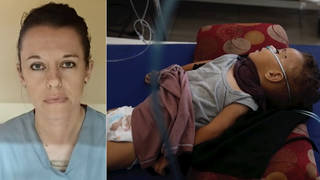
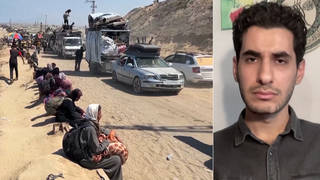
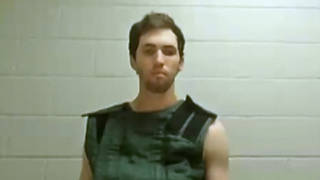
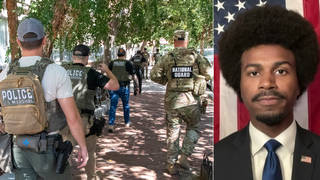





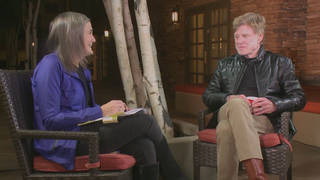
Media Options